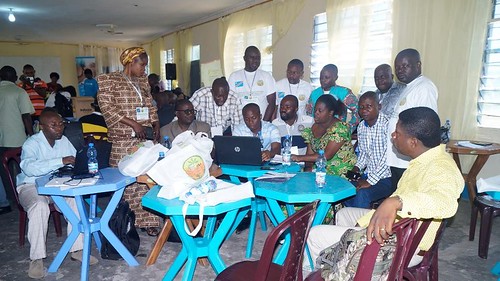The province of kwango acquires a charter and a roadmap to combat malnutrition
The provincial Government of Kwango organized a provincial conference in Kenge from 22 to 24 August 2017, with the technical and financial support of UNICEF, on the repositioning of nutrition as a development priority. This conference forms part of national efforts and commitments to scale up nutrition (SUN), aiming to create a multi-sectoral environment that is favourable to nutrition in Kwango. At the end of the three days’ work, its participants adopted a Provincial Charter incorporating different stakeholders’ commitments to the fight against malnutrition and agreed to establish a provincial multi-sectoral governance and coordination committee for the fight against malnutrition in Kwango.

From 22 to 24 August 2017, the provincial Government of Kwango organized a provincial conference in Kenge, with the technical and financial support of UNICEF, on the repositioning of nutrition as a development priority. This conference forms part of national efforts and commitments to scale up nutrition (SUN), aiming to create a multi-sectoral environment that is favourable to nutrition in Kwango. At the end of the three days’ work, its participants adopted a Provincial Charter incorporating different stakeholders’ commitments to the fight against malnutrition and agreed to establish a provincial multi-sectoral governance and coordination committee for the fight against malnutrition in Kwango.
The DRC has more than 6 million malnourished children, with a chronic malnutrition prevalence of 43%. In Kwango, according to the 2013-2014 Demographic and Health Survey (EDS 2013-2014), approximately 45.6% of children, or 1 in 2, suffer from chronic malnutrition. In absolute numbers that equates to over 220,000 children aged under 5 years. The percentage of underweight women aged 15 to 49 is the highest in the DRC, at 31.1%, according to the same survey. In addition, the health areas of Kwango province have benefited from responses to the nutritional crises that occur on a recurring basis. This is a province with a level 4 chronic food insecurity situation.
Foremost among the drivers of malnutrition have been identified food taboos for women and children, the abandonment of the entire burden of the household to the woman, women’s low educational levels and poor eating habits.
Moreover, local experiences of previous interventions and strategies to combat malnutrition in Kwango shared by different participants showed the importance of the community-based and action research approach to interventions to fight malnutrition. “Vamine®”, a high nutritional value food supplement made using local Kwango products was presented by a Kinshasa University research centre in the course of the conference.
Several speakers also highlighted the positive influence of nutrition-sensitive interventions, such as water, hygiene and sanitation, education, health, agriculture, social protection, research, women’s empowerment and community participation in the strategy to combat malnutrition. The negative impact of malnutrition on economic growth and worsening poverty was also explained.
Changing the nutritional status of children and women in Kwango is at the basis of local authorities’ actions, but the conference was reminded of the need to allocate more resources to the fight against chronic malnutrition to reverse the trend. According to a World Bank study, “Implementing 10 nutrition-specific interventions in all regions of the DRC would cost $371 million annually”.
When time was up and discussions were over, the conference participants produced a draft road map for addressing the malnutrition situation with contributions from such key areas as social protection, agriculture and rural development, water, and health, proposing strategies for governance, communication, outreach, mobilization, advocacy and research.
It should be noted that this conference brought together more than 120 participants from health, agriculture, the media, non-government organizations, religious denominations, and political and administrative officials, in addition to technical and financial partners World Bank, UNICEF and FAO. The conference was closed by the signing of the “Kenge Charter for the fight against malnutrition” and a suggested order establishing the provincial multi-sectoral governance and coordination committee for the fight against malnutrition that will be proposed to the Council of Ministers.
The forum’s recommendations were adopted by the provincial governor who, in his closing speech, acknowledged that “malnutrition is the enemy of our development” and that efforts will be followed up to ensure good governance of nutrition and the return to the earth.
